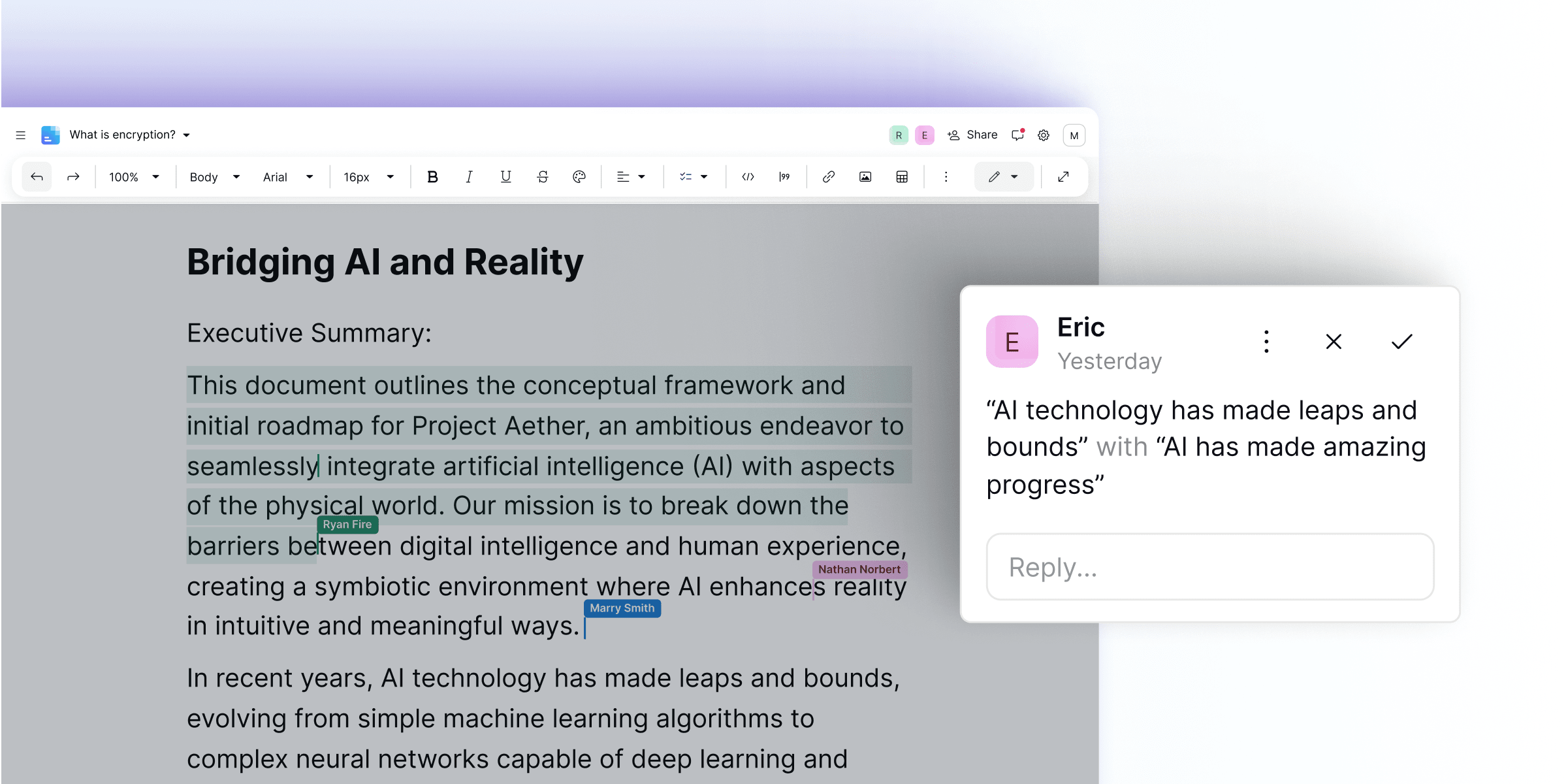Billions of people use online document editors like Google Docs or Microsoft 365 to write reports, collaborate on projects, and keep track of meeting notes. But there is a growing concern about Big Tech platforms having access to your content, tracking you across the web, and collecting data to train privacy-invading AI models.
Today we’re announcing a new end-to-end encrypted, collaborative document editor that puts your privacy first. Docs in Proton Drive are built on the same privacy and security principles as all our services, starting with end-to-end encryption. Docs let you collaborate in real time, leave comments, add photos, and store your files securely. Best of all, it’s all private — even keystrokes and cursor movements are encrypted.
Get started by creating a free Proton Drive account today (if you don’t already have one). We are rolling out Docs starting today, and the feature will be available to all users over the next couple of days. At that time, if you go to drive.proton.me(new window) and click on New in the top left, you will see the ability to create a New document.

Why we’re launching a privacy-first document editor
Online document editors have become a core productivity tool, used for everything from private journals to sensitive business strategies. The problem is that most companies offering document editors today are the same Big Tech companies that collect and monetize your private information.
As a result, there are multiple significant issues:
- Mass data collection — Document editors such as Google Docs can see everything you write and keep a record of all changes that you have ever made. Once you provide your data to these companies, you no longer have control over how it is used. Data that you think is private may even be used to train AI in the future. It no wonder people are learning how to deGoogle their lives.
- Risk of data breaches — No major document editor protects your data with end-to-end encryption by default, which leaves your documents vulnerable to hackers and data breaches. When companies can decrypt your data, it’s like leaving the key next to the safe.
- Weak privacy laws — Tech companies with headquarters and data centers in the US are subject to bulk surveillance and lax data protection laws.
- Third-party and government access — Without end-to-end encryption or strong legal protections, your documents are subject to warrantless surveillance and data sharing(new window).
When you write in a document, you would like to think your ideas are only for you and the people you choose to share with. But that’s not really the case.
Take action now: DeGoogle your life for $1
Bringing Proton privacy to collaborative online documents
We built Docs in Proton Drive as a joint project with the team from Standard Notes, who share our core values around privacy and security.
As with all Proton services, Docs put you back in control of your data. Thanks to our open-source end-to-end encryption, you are the only one with the key to read and share your documents. Not even Proton can access your docs content or metadata (such as file names). Instead of storing your data in the US, where it can be subject to government surveillance, Proton is protected by strict Swiss privacy laws.
Docs is integrated into your Proton Drive, meaning you have a unified and secure space for your document management and storage. We designed Docs to be a clean, simple experience, where you can:
- Write with privacy — Create and edit documents within Proton Drive, knowing your contents are only accessible to you and those you choose to share with.
- Share and invite anyone — Invite other users to view or edit your documents with a single click.
- Collaborate in real-time — Changes are reflected immediately, ensuring every contributor always sees the most up-to-date version.
- View cursors and presence indicators — See who else is viewing or editing the document, enhancing teamwork and communication.
- Leave comments and replies — Add comments to share feedback without editing the document. Comments are visible to all collaborators, keeping everyone in the loop.
- Import and export with ease — You can upload .docx documents, edit them, and download in various formats like .docx, .txt, .md, and HTML.

A complete privacy-first ecosystem
Far too often, online productivity suites require you to accept surveillance as a condition of use. Docs is a milestone in our journey to building a better internet where privacy is the default. It is the first collaborative document editor that combines open source end-to-end encryption within a secure ecosystem that includes email, cloud storage, calendar, and more, so you can break away from Big Tech services that exploit your data. This is another important step toward advancing the mission of the nonprofit Proton Foundation.(new window)
With Proton Drive and Docs, you now have a secure, privacy-first cloud storage and productivity alternative. If you’re working in law firms or healthcare, you can draft contracts and manage patient data in compliance with privacy laws. Journalists, content creators, and entrepreneurs can keep their projects protected from data leaks and Big Tech surveillance (no AI snooping on your work). Whether for work or for personal use, Proton Drive ensures your documents remain safe and private.
We’re excited to see how you will benefit from the robust privacy protections that Docs offer. Ready to get started? Check out Docs in Proton Drive and start collaborating privately.
To get the best experience in Docs, please be sure to update your Proton Drive app(new window) to the latest version on desktop and mobile.